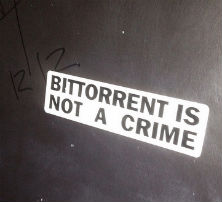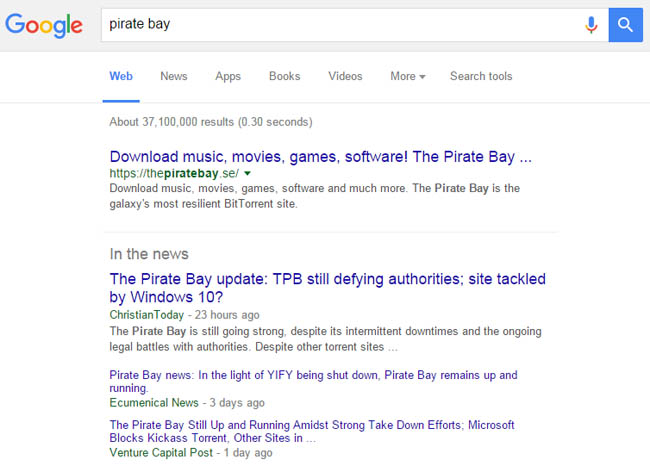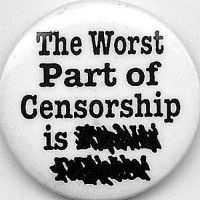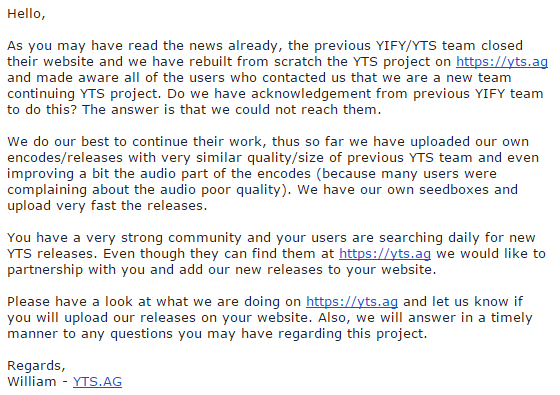BitTorrent Usage Doesn’t Equal Piracy, Cox Tells Court
dimanche 15 novembre 2015 à 18:46 Last year BMG Rights Management and Round Hill Music sued Cox Communications, arguing that the ISP fails to terminate accounts that are frequently used to pirate content.
Last year BMG Rights Management and Round Hill Music sued Cox Communications, arguing that the ISP fails to terminate accounts that are frequently used to pirate content.
The case is crucial as it may define the obligations of Internet providers hoping to keep their safe harbor protections. Ideally, the music companies would like to have the accounts of repeat infringers terminated.
Both sides are currently preparing for trial and Cox recently submitted a motion to the court, where it asks for a ban on statements and evidence which equate BitTorrent to piracy.
Earlier this week we reported on Cox’s argument that the direct piracy evidence gathered by the music companies can’t be trusted, and now the ISP also wants to cut off alternative arguments.
“Plaintiffs seek to introduce testimony and third-party hearsay — with inflammatory statements such as ‘File-Sharing Is Really About Piracy’ — as proof that BitTorrent use equates to the existence of infringement,” Cox writes (pdf).
“Once they have argued that BitTorrent use is automatically infringing, Plaintiffs seek to introduce other testimony and documents showing that some proportion of data traffic on Cox’s network is associated with BitTorrent in order to mislead the jury into thinking that Cox knew or should have known about the infringement that Plaintiffs allege.”
Instead of generalizing BitTorrent traffic as copyright infringement, the music companies should offer direct proof that Cox subscribers pirated their work. Any other allegations are inappropriate and misleading according to Cox.
“Plaintiffs are free to try to prove that specific BitTorrent users on Cox’s network actually infringed Plaintiffs’ copyrights, but the Court should preclude Plaintiffs from relying on mere innuendo that BitTorrent inherently allows individuals to infringe Plaintiffs’ copyrights.”
The Internet provider further stresses that there are plenty legitimate uses for the popular file-sharing protocol. It’s not just a technology that’s exclusidely used by pirates.
“Cox disputes Plaintiffs’ characterization of BitTorrent — it is demonstrably not true that there are no legitimate uses for BitTorrent,” the ISP writes.
“Plaintiffs have no evidence that most or all use of BitTorrent, which is simply a communication protocol, constitutes infringement of Plaintiffs’ copyrights.”
In conclusion, Cox asks the court to prohibit BMG Rights Management and Round Hill Music from testifying or arguing that BitTorrent is primarily used for copyright infringement, so that it can’t mislead the jury during trial.
For their part, the music companies submitted a similar request related to Cox’s use of the terms “troll” or “extortionist.” In addition, they don’t want the ISP to argue that their tracking company Rightscorp violated debt collection or private investigation licensing laws.
It’s now up to the court to decide which arguments will be permitted during trial and what will be off-limits.
Source: TorrentFreak, for the latest info on copyright, file-sharing, torrent sites and ANONYMOUS VPN services.
 The music and movie industries love to poke the finger at Google and blame the technology giant for a world of woes, not least the appearance of ‘rogue’ sites in its search results.
The music and movie industries love to poke the finger at Google and blame the technology giant for a world of woes, not least the appearance of ‘rogue’ sites in its search results.

 When Megaupload was raided early 2012 the U.S. Government seized 1,103 servers at Carpathia’s hosting facility in the United States.
When Megaupload was raided early 2012 the U.S. Government seized 1,103 servers at Carpathia’s hosting facility in the United States. Almost exactly one year ago, Universal Music, Sony Music, Warner Music, Nordisk Film and the Swedish Film Industry teamed up against Swedish ISP Bredbandsbolaget (Broadband Company).
Almost exactly one year ago, Universal Music, Sony Music, Warner Music, Nordisk Film and the Swedish Film Industry teamed up against Swedish ISP Bredbandsbolaget (Broadband Company). Late last month one of the biggest piracy icons
Late last month one of the biggest piracy icons 